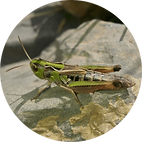

DIVERGEN: Patterns and processes of genomic divergence along the speciation continuum in two recent evolutionary radiations: a multidisciplinary and integrative approach

BACKGROUND
Understanding the processes that generate and maintain biological diversity and how these interact with landscape history is a central theme in biogeography and evolutionary biology. Information across the whole spatiotemporal spectrum at which these processes take place is also necessary to preserve biodiversity at its different levels, from ecosystems and communities to unique intraspecific evolutionary processes. The study of recent evolutionary radiations is particularly attractive to address these questions because the signatures of speciation have not been fully erased by time and, thus, it is possible to infer processes from patterns in genomic data.
GOAL
The goal of DIVERGEN is to integrate next generation sequencing (NGS) techniques, detailed phenotypic information and spatial modelling to unravel the factors promoting recent evolutionary radiations and infer the evolutionary processes underlying spatial patterns of genetic, ecological and phenotypic divergence. This project will use as model systems two species complexes of montane grasshoppers to understand the consequences of past climatic changes and the role of geography, environment and adaptation processes in 1) species diversification phenomena (Objective 1) and 2) regional and local intraspecific patterns of genomic variation (Objective 2). Thus, we aim to track the organism diversification process from those stages that shape early genetic and phenotypic divergence at small spatial scales through the incipient speciation end, both of which are well represented in these species complexes composed by several recently diverged taxa but with different ecological and habitat requirements.

SCHEMATIC OF DIVERGEN


PUBLICATIONS
SCIENTIFIC PUBLICATIONS
10. Noguerales V, Ortego J (2022) Genomic evidence of speciation by fusion in a recent radiation of grasshoppers. Evolution, in press. [PDF] [Digest by Sean Stankowski - PDF]
9. Tonzo V, Ortego J (2021) Glacial connectivity and current population fragmentation in sky islands explain the contemporary distribution of genomic variation in two narrow-endemic montane grasshoppers from a biodiversity hotspot. Diversity and Distributions, 27: 1619-1633. [PDF]
8. Tonzo V, Papadopoulou A, Ortego J (2020) Genomic footprints of an old affair: Single nucleotide polymorphism data reveal historical hybridization and the subsequent evolution of reproductive barriers in two recently diverged grasshoppers with partly overlapping distributions. Molecular Ecology, 29: 2254-2268. [PDF]
7. Tonzo V, Papadopoulou A, Ortego J (2019) Genomic data reveal deep genetic structure but no support for current taxonomic designation in a grasshopper species complex. Molecular Ecology, 28: 3869-3886. [PDF]
6. Noguerales V, Cordero PJ, Ortego J (2018) Integrating genomic and phenotypic data to evaluate alternative phylogenetic and species delimitation hypotheses in a recent evolutionary radiation of grasshoppers. Molecular Ecology, 27: 1229-1244. [PDF]
5. Noguerales V, Cordero PJ, Ortego J (2018) Inferring the demographic history of an oligophagous grasshopper: Effects of climatic niche stability and host-plant distribution. Molecular Phylogenetics and Evolution, 118: 343-356. [PDF]
4. Ortego J, Noguerales V, Cordero PJ (2017) Geographical and ecological drivers of mitonuclear genetic divergence in a Mediterranean grasshopper. Evolutionary Biology, 44: 505-521. [PDF]
3. Noguerales V, Cordero PJ, Ortego J (2017) Testing the role of ancient and contemporary landscapes on structuring genetic variation in a specialist grasshopper. Ecology and Evolution, 7: 3110-3122. [PDF]
2. Noguerales V, García-Navas V, Cordero PJ, Ortego J (2016) The role of environment and core-margin effects on range-wide phenotypic variation of a montane grasshopper. Journal of Evolutionary Biology, 29: 2129-2142. [PDF]
1. Noguerales V, Cordero PJ, Ortego J (2016) Hierarchical genetic structure shaped by topography in a narrow-endemic montane grasshopper. BMC Evolutionary Biology, 16: 96. [PDF]
POPULAR SCIENCE PUBLICATIONS
1. Tonzo V, Papadopoulou A, Ortego J (2019) El saltamontes de los Pirineos: cuando dos especies resultan ser la misma. Quercus, 406: 18-23. [in Spanish]

GALLERY
FUNDING

































